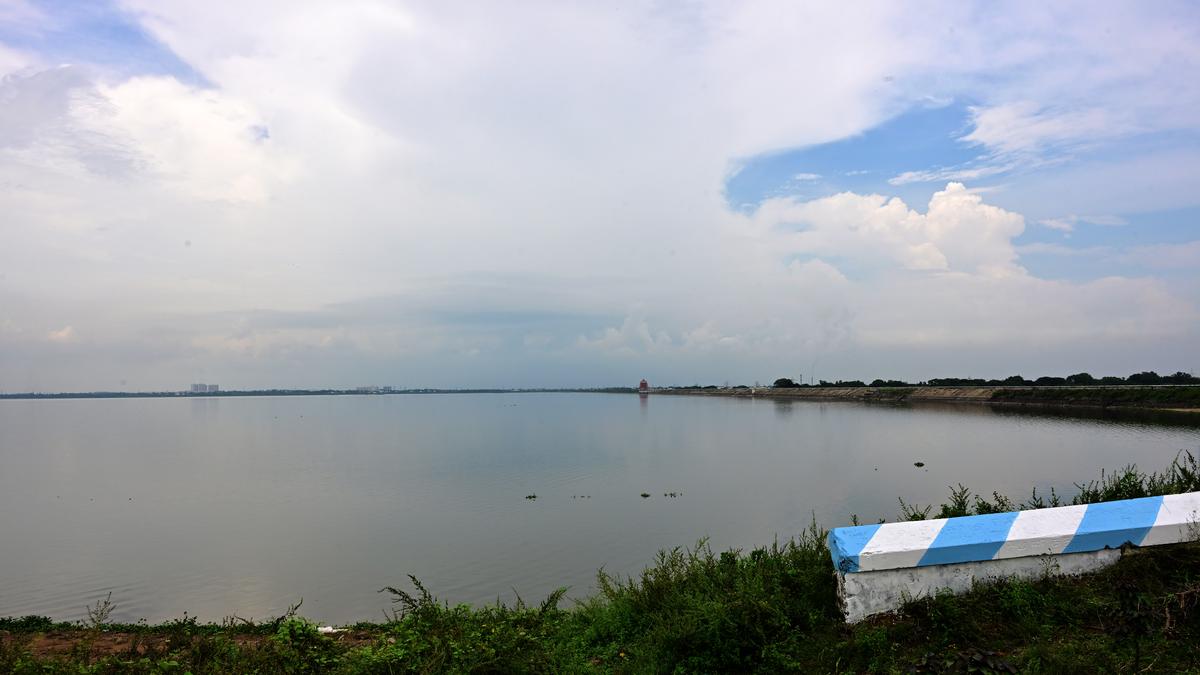Chennai’s vital water reservoirs are experiencing a notable reduction in their collective storage capacity, a direct consequence of inadequate summer rainfall in their critical catchment areas. As of Sunday, the combined reserves across the city’s primary drinking water sources — Puzhal, Poondi, Chembarambakkam, Cholavaram, Kannankottai, and Thervoykandigai lakes — stood at 6,682 million cubic feet (mcft). This represents a significant decline of 56.83 percent from their total capacity of 11,757 mcft, underscoring the delicate balance of urban water security.
The current hydrological landscape reveals Puzhal Lake holding 2,456 mcft, Poondi Lake at 2,251 mcft, and Chembarambakkam Lake containing 1,594 mcft. Smaller yet crucial contributors, Thervoykandigai Lake and Cholavaram Lake, registered 274 mcft and 157 mcft respectively. While these figures indicate a substantial dip from full capacity, water management authorities have offered assurances that the city is not facing an immediate crisis. Experts estimate Chennai’s monthly drinking water requirement at approximately 1,000 mcft, or 1 TMC, and with current reserves at a robust 6 TMC, officials from the Chennai Metropolitan Water Supply and Sewerage Board project no water shortage for the remainder of the year.
This optimistic outlook, however, is significantly bolstered by the city’s strategic investments in alternative water sources. The operational desalination plants at Meenjur and Nemmeli play an indispensable role in purifying seawater, thereby ensuring a consistent daily supply of potable water to the urban populace. These advanced facilities mitigate the city’s historical over-reliance on monsoon-dependent reservoirs, providing a crucial buffer against climatic variability. Such infrastructure is paramount for a rapidly expanding metropolis like Chennai, which is committed to forging a sustainable and resilient urban future, less susceptible to the vagaries of weather patterns and more aligned with zero net carbon aspirations through potential renewable energy integration.
The long-term sustainability of Chennai’s water supply hinges not just on diversified sources but also on a comprehensive approach to water resource management. While desalination offers a technological solution, its energy intensity necessitates a parallel focus on renewable energy integration to align with the city’s net-zero carbon objectives. Furthermore, promoting eco-friendly practices such as widespread rainwater harvesting, augmenting groundwater recharge, and implementing smart water grids are essential for building a truly resilient urban water ecosystem. These measures not only conserve precious freshwater resources but also reduce the ecological footprint associated with water procurement and distribution.
Beyond infrastructure, the human element remains central to Chennai’s water narrative. Equitable access to clean water is a fundamental pillar of a just and gender-neutral city. In times of scarcity, women and marginalised communities often bear a disproportionate burden in water collection and management, highlighting the critical need for inclusive water policies. Authorities are continuously monitoring the situation and have rightly urged the public to exercise responsible water usage. This call for civic participation is crucial; every household’s commitment to conservation, from fixing leaks to adopting water-efficient appliances, contributes significantly to the collective water security of the city.
The current scenario, while managed, serves as a timely reminder of the imperative for Chennai to continually innovate and adapt its water management strategies. Future urban planning must integrate robust water conservation principles at every level, from building codes mandating rainwater harvesting to public education campaigns fostering a culture of water stewardship. Investing in advanced wastewater treatment for reuse in non-potable applications, and exploring inter-basin water transfers where feasible and environmentally sound, will further fortify the city’s water resilience. These proactive measures are vital for ensuring that Chennai remains a habitable and thriving urban centre for generations to come.
Ultimately, Chennai’s ability to navigate future climatic challenges and maintain its growth trajectory will be intrinsically linked to its foresight in water governance. The current dip in reservoir levels, while not immediately alarming, underscores the need for perpetual vigilance and strategic investment in a multi-pronged water security framework. By combining technological advancements like desalination with community-led conservation efforts and ecologically sound practices, Chennai can solidify its position as a model for sustainable urban water management, ensuring a consistent and equitable supply for all its citizens.
Also Read :Kochis Marine Drive walkway faces environmental concerns and maintenance issues


